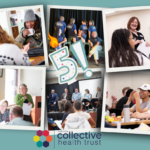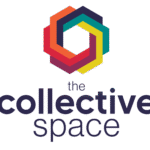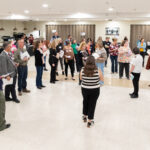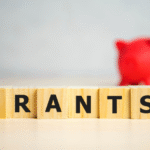
At the Health Trust, we work to improve our community by tackling some of the most significant challenges that affect health and wellbeing – like preventing and addressing the harmful effects of adverse childhood experiences (ACEs).
What are ACEs?
ACEs were first introduced in a 1995 study by Dr. Vincent Felitti and Dr. Robert Anda. The research showed how childhood trauma can impact both individuals and communities in lasting ways. ACEs include things like:
- Physical, sexual, or verbal abuse
- Physical or emotional neglect
- Witnessing abuse in the home
- Losing a parent or guardian
- Having a family member struggling with mental health issues, substance use, or incarceration
When kids go through these tough experiences, it can lead to health problems later on: people who are exposed to ACEs in high doses have significantly higher rates of heart disease, lung cancer, depression and diabetes. There are employer-related impacts as well, with correlations between an employee’s ACEs score and their performance at work. ACEs-related health problems cost the U.S. economy a staggering $14.1 trillion each year ($183 billion in direct medical spending and $13.9 trillion in lost healthy life-years).
Why does trauma have such a big impact?
Trauma can be any event where there’s a real or perceived threat of injury, death, or serious harm. You can think of it like this: Imagine you’re walking in the woods and come across a pack of wolves. Your body would go into “fight or flight” mode, releasing stress hormones and increasing blood flow. Now, imagine that feeling happening over and over again, every time a child returns to an unsafe or abusive home. It can have a lasting impact on their health and development.
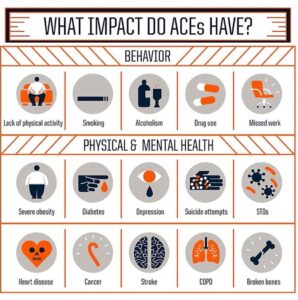
What can we do about it?
While the statistics might seem overwhelming, there’s hope. Research on positive childhood experiences (PCEs) shows that the brain is adaptable, and we can help shift the trajectory for kids who have faced trauma. ACEs don’t have to define someone’s future, and communities can help build resilience by fostering positive experiences that counteract the harmful effects of trauma.
Here are some examples of things we can do:
- Strengthening family economic supports, with things like affordable childcare and food security programs.
- Give kids a strong start with programs that offer support and education to new parents.
- Create safe spaces for youth, like community centers, after-school programs, and mentorship opportunities where kids can build relationships with caring adults.
- Teach healthy coping skills, such as offering parenting classes that focus on positive discipline and stress management.Step in early by training educators, healthcare providers, and law enforcement to better understand and support kids dealing with adversity.
Ultimately, ACEs research encourages us to shift our mindset and ask, “What happened to you?” rather than “What’s wrong with you?” when we’re trying to understand each other’s challenges. ACEs give us a new way to look at people’s experiences and figure out how we can support them.
Remember: ACEs are facts, but they’re not fate. Together, we can change these facts and work toward a healthier, stronger community for everyone, especially our kids.
For more information:
Campbell JA, Walker RJ, Egede LE. Associations between adverse childhood experiences, high-risk behaviors, and morbidity in adulthood. Am J Prev Med. 2016;50(3):344-352. doi:10.1016/j.amepre.2015.07.022
Centers for Disease Control and Prevention. Preventing Adverse Childhood Experiences: Leveraging the Best Available Evidence. National Center for Injury Prevention and Control, Centers for Disease Control and Prevention; 2019.
Centers for Disease Control and Prevention. Adverse Childhood Experiences Prevention Strategy. National Center for Injury Prevention and Control, Centers for Disease Control and Prevention; 2021.
Peterson C, Aslam MV, Niolon PH, et al. Economic Burden of Health Conditions Associated With Adverse Childhood Experiences Among US Adults. JAMA Netw Open. 2023;6(12):e2346323. doi:10.1001/jamanetworkopen.2023.46323
